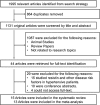Association between serum resistin concentration and hypertension: A systematic review and meta-analysis
- PMID: 28525369
- PMCID: PMC5522312
- DOI: 10.18632/oncotarget.17561
Association between serum resistin concentration and hypertension: A systematic review and meta-analysis
Abstract
Objectives: Recent studies have suggested the involvement of adipokines in the pathogenesis of cardiovascular diseases, including hypertension. In this study, we evaluated the significance of serum resistin levels in hypertensive patients using a meta-analysis approach.
Materials and methods: Relevant articles were retrieved by searching the following databases: PubMed, Embase, Ovid Medline, ISI Web of Knowledge. The retrieved studies were subjected to a thorough screening procedure to identify case-control studies that contained the required data. Data were extracted from each study and analyzed by Stata software and Review Manager software. In total, 14 case-control studies, containing 718 hypertensive patients and 645 normotensive controls, were included in this study. The major result of the meta-analysis revealed a statistically significant association between serum resistin concentration and hypertension (SMD = 0.85, 95% CI: [0.15, 1.54]), and the association was more obvious in Asian and Hispanic populations, diabetic population and studies with larger size cohorts. Publication bias was a low probability event for overall comparisons.
Conclusions: Based on our results, we conclude that serum resistin level in hypertensive patients is higher than normotensive controls, indicating resistin might be a risk factor for hypertension.
Keywords: hypertension; meta-analysis; resistin.
Conflict of interest statement
The authors have declared that no competing interests exist.
Figures






Similar articles
-
Systemic pharmacological treatments for chronic plaque psoriasis: a network meta-analysis.Cochrane Database Syst Rev. 2021 Apr 19;4(4):CD011535. doi: 10.1002/14651858.CD011535.pub4. Cochrane Database Syst Rev. 2021. Update in: Cochrane Database Syst Rev. 2022 May 23;5:CD011535. doi: 10.1002/14651858.CD011535.pub5. PMID: 33871055 Free PMC article. Updated.
-
Non-contraceptive oestrogen-containing preparations for controlling symptoms of premenstrual syndrome.Cochrane Database Syst Rev. 2017 Mar 3;3(3):CD010503. doi: 10.1002/14651858.CD010503.pub2. Cochrane Database Syst Rev. 2017. PMID: 28257559 Free PMC article.
-
Effect of cocoa on blood pressure.Cochrane Database Syst Rev. 2017 Apr 25;4(4):CD008893. doi: 10.1002/14651858.CD008893.pub3. Cochrane Database Syst Rev. 2017. PMID: 28439881 Free PMC article.
-
Drugs for preventing postoperative nausea and vomiting in adults after general anaesthesia: a network meta-analysis.Cochrane Database Syst Rev. 2020 Oct 19;10(10):CD012859. doi: 10.1002/14651858.CD012859.pub2. Cochrane Database Syst Rev. 2020. PMID: 33075160 Free PMC article.
-
Effects of a gluten-reduced or gluten-free diet for the primary prevention of cardiovascular disease.Cochrane Database Syst Rev. 2022 Feb 24;2(2):CD013556. doi: 10.1002/14651858.CD013556.pub2. Cochrane Database Syst Rev. 2022. PMID: 35199850 Free PMC article.
Cited by
-
Blood Circulating Levels of Adipokines in Polycystic Ovary Syndrome Patients: A Systematic Review and Meta-analysis.Reprod Sci. 2021 Nov;28(11):3032-3050. doi: 10.1007/s43032-021-00709-w. Epub 2021 Sep 1. Reprod Sci. 2021. PMID: 34472034
-
The Association between Serum Resistin Level, Resistin (-420C/G) Single Nucleotide Variant, and Markers of Endothelial Dysfunction, including Salt Taste Preference in Hypertensive Patients.Nutrients. 2022 Apr 24;14(9):1789. doi: 10.3390/nu14091789. Nutrients. 2022. PMID: 35565757 Free PMC article.
-
Serum resistin: A possible link between inflammation, hypertension and coronary artery disease.Pak J Med Sci. 2019;35(3):641-646. doi: 10.12669/pjms.35.3.274. Pak J Med Sci. 2019. PMID: 31258568 Free PMC article.
-
Blood Plasma Resistin and Atrial Fibrillation in Patients With Cardiovascular Disease.Cardiol Res. 2020 Oct;11(5):286-293. doi: 10.14740/cr1121. Epub 2020 Aug 1. Cardiol Res. 2020. PMID: 32849963 Free PMC article.
-
Adipokines and Adipose Tissue-Related Metabolites, Nuts and Cardiovascular Disease.Metabolites. 2020 Jan 11;10(1):32. doi: 10.3390/metabo10010032. Metabolites. 2020. PMID: 31940832 Free PMC article. Review.
References
-
- Steppan CM, Bailey ST, Bhat S, Brown EJ, Banerjee RR, Wright CM, Patel HR, Ahima RS, Lazar MA. The hormone resistin links obesity to diabetes. Nature. 2001;409:307–312. - PubMed
-
- Lazar MA. Resistin- and Obesity-associated metabolic diseases. Horm Metab Res. 2007;39:710–716. - PubMed
-
- Banerjee RR, Rangwala SM, Shapiro JS, Rich AS, Rhoades B, Qi Y, Wang J, Rajala MW, Pocai A, Scherer PE, Steppan CM, Ahima RS, Obici S, et al. Regulation of fasted blood glucose by resistin. Science. 2004;303:1195–1198. - PubMed
Publication types
MeSH terms
Substances
LinkOut - more resources
Full Text Sources
Other Literature Sources
Medical
Molecular Biology Databases

